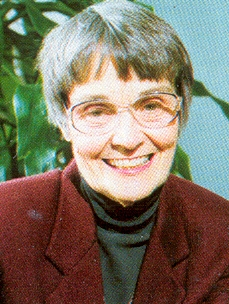Award winner 1999: Theo Colborn

Theo Colborn received the prize for her long standing work in the field of environmental toxicology to promote awareness and knowledge for the implications of toxic chemicals. Dr. Colborn's work has triggered world-wide public concern about endocrine disruptors, and has prompted enactment of new laws by governments and redirection of research by governments, the private sector and academics.
Relevant links:
The prize was given to her "in absentia" by Minister Guro Fjellanger in 1999, and by the County Prefect, Tora Aasland, in 2000, when she came to receive it.
Dr. Theo Colborn has served as Senior Program Scientist and directed the Wildlife and Contaminants Program at World Wildlife Fund in Washington, USA.
She is the author of numerous scientific publications on toxic substances that interfere with hormones and other chemical messengers that control development in wildlife and humans. She edited "Chemically Induced Alterations in Sexual and Functional Development: The Wildlife/Human Connection", published in 1992.
The information from this volume and numerous subsequent scientific publications was popularized in the 1996 book, "Our Stolen Future", co-authored with Dianne Dumanoski and J. Peterson Myers. "Our Stolen Future" has been published in more than a dozen languages around the world. Dr. Colborn's work has triggered world-wide public concern about endocrine disruptors, and has prompted enactment of new laws and redirection of of research.
Dr. Colborn has served on numerous advisory panels, including the US. Environmental Protection Agency Science Advisory Board. She lectures on the transgenerational effects of toxic chemicals on the developing endocrine, immune and nervous systems in the womb and early childhood.
In 1985 Dr. Colborn received a Fellowship from the Office of Technology Assessment, US.Congress, where she worked on human and ecotoxicological issues. She joined the Conservation Foundation in 1987 to provide scientific guidance for the 1990 book "Great Lakes, Great Legacy?" in collaboration with the institute for Research and Public Policy, Ottawa, Canada. She held a Chair for three years with the W. Alton Jones Foundation, and in 1993 was given a three year Pew Fellows Award.
Dr. Colborn earned a Ph.D. (distributed minors in epidemiology, toxicology and water chemistry),at the University of Wisconsin-Madison in Zoology; an M.A in science (freshwater ecology) at Western State College of Colorado; and a B.S. in pharmacy from Rutgers University, College of Pharmacy.
Theo Colborn's first career was as a pharmacist, where she and her husband operated three pharmacies in New Jersey. They sold these businesses in 1962 and moved to Colorado, where they raised their four children on a ranch. Theo fought as a citizen an active but losing battle to protect the water of the valley. In 1978 she enrolled in a Masters Degree Program to become a more effective spokesperson for water quality issues. Theo continued her university education and was awarded a Ph.D in 1985 at the age of 58.
